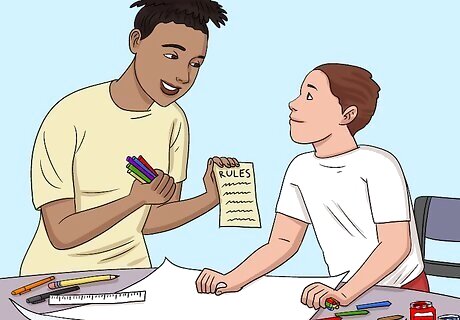
views
Establishing the Ground Rules

Explain the rules and their reasoning. Everyone has different parenting styles and sometimes you’ll come across children who are used to an environment with fewer rules than you’re comfortable with. To help the difficult child adapt to the rules in your babysitting environment, it’s wise to thoroughly explain your rules, age permitting. It’s a good idea to sit down with both the parents and the child when explaining the rules so the child knows you’re all on the same page. Depending on the age of the child, try sitting them down and saying something like “One rule is that you keep your hands to yourself at all times because I don’t want you to hurt anyone, or get hurt by anyone.” This works well if the child is old enough to understand cause and effect, typically adequate for children ages 5-10. A 2-year-old for example, may not understand why they aren't allowed to do something, but can understand the word "no" and be redirected to another activity.

Make a rule chart. After you’ve explained your rules and the reasoning behind them, have the child assist you in making a rule chart that you can refer to when they start to act out. If the child is old enough to read, have them recite the rule they are breaking whenever they misbehave. Grab some construction paper and markers and have them help you write out a numbered list of the rules. You can even let them decorate the chart. Bring the chart with you whenever you babysit and put it somewhere visible to the child. When they break one of the rules, stop them and say “Tommy, remember rule number 3? What does it say?” Point to the rule on your chart and have them recite why it is off limits. You could offer a reward if the child follows the rules and behaves well.

Explain the consequences of broken rules. After you’ve explained what is expected from them and why it’s expected, tell the child what kind of repercussion will occur if one of your rules is broken. You can say something like “If you put your hands on someone else, you will be sent to time out.” Or "If you throw a tantrum, you will not be allowed to watch TV." Some sample punishments are taking away desserts, taking away a particular privilege (time with electronics), stopping whatever activity they are doing (don’t allow them to finish their craft), or taking away TV time or time playing outside. If the child is older, say 11-13, more effective punishments might include something like taking away their cell phone, tablet, or favorite video game.

Follow through with the consequences. The first time you allow a rule to be broken without the consequence you promised would follow, the child learns they can get away with acting out. Handling difficult children is all about consistency. If your rule chart says that talking back to adults will result in not being able to watch TV; you MUST turn off the TV. Even if you were in the middle of a show that you actually liked, the consequence must be followed through, or the difficult child won’t take any of your rules seriously. If the child protests, explain that your job is to enforce their parents' family rules, even if you didn't make them yourself.

Come bearing gifts. You don’t want the child to only associate you with rules and consequences, or they could begin resenting your presence. Try bringing a toy, treat, or new activity with you to each babysitting session. This will create excitement for your time together and can be used as another tool for maintaining the rules. Explain to the child that you’re not obligated to bring gifts or fun things to do, and if they misbehave, you will stop. For example, bake some cookies to bring with you. Before letting Tommy have one, look him in the eyes and say “I like to bring goodies for you, but I don’t have to. These cookies are only for when you’re behaving nicely. If you break a rule, you won’t get any, and I won’t bring anything next time. Do you understand?”
Communicating with the Parents

Report the issues. If you’re struggling with a child, the first person you should tell is the parent. It may not be easy for everyone to hear that their child is considered difficult to deal with, but keeping open communication is essential when babysitting. Some kids act completely differently for their babysitter than they do for their parents. If the parents don’t know you’re having trouble, they can’t do anything to help fix the issue. If Tommy had a tantrum over eating his lunch and threw his plate at you, try telling the parent something like “Tommy had a pretty good day today, but I have to be honest with you, he behaved very poorly at lunch. In response to that behavior, he had to sit in time out for 5 minutes.” If the child is older; you might be surprised what "version" of the day's events they tell their parents later. To combat feeling like it's your word against theirs, try to tell the parents of any issues as soon as they happen. A quick phone call or text immediately afterwards ensures you won't forget, and the parents are kept up to date with an accurate account of the situation. You could also ask the parents for their permission to record their children’s misbehavior on your phone so you can send or show them the video.

Get some guidance. Good advice from the parents of the difficult child can be your best asset in combating unruly behavior. Politely explain to the parents that you are experiencing severe difficulty babysitting their kid, and ask them how they handle similar situations at home. Consistency between you and the parents will create a stable environment for the child and help curb negative behaviors. Try starting the conversation with something like “I absolutely love babysitting Tommy, but I am having difficulties with a few things I was hoping you could help me with. He seems to throw frequent tantrums, how do you handle these at home?” You can also try saying “I think it would really help Tommy if we were on the same page. When he acts out, what consequence do you give him?” In the event the parents of the misbehaved kid don’t have any tips, ask your friends who have children how they handle tantrums and whatever other behaviors you’re trying to deal with. Chances are you’re not alone, someone you know has dealt with similar issues and will be able to give you some ideas that worked for them.

Create consistency. Now that the parents are aware of the issues and have told you how they handle bad behavior at home, try your best to combine their rules and consequences with your ground rules. Your goal is to create as much consistency as possible, even if they have a rule you didn’t consider. For instance, you may not care if the child runs in the house instead of walking. But if the parents tell you that is a rule implemented at their house, you should add it to your rule chart. If the child is older; you may not think anything of letting them watch Cartoon Network, only to find out their parents have forbidden certain programs. Always adapt what is and isn't allowed while you're babysitting to what the parents do at home. If you think a child is lying to you about the rules or trying to bend the truth, be honest and say, "I'm not sure about that, so let's wait until your parents get home, and we can ask them for next time."
Defusing Tantrums

Remain calm. You may be very frustrated, but it is crucial that you never take your frustrations out on the child. When you feel yourself getting upset, stop and take a deep breath. Remind yourself that they are the child, and you are the adult who is in control of the situation.

Give them some space. Assuming no safety issues, walk away for a few minutes so that you can continue calming down, while the kid defuses their anger. Once they learn that tantrums don’t result in the kind of attention they want, they will stop using that as a tactic.

Distract them. Tell them that tantrums don’t result in whatever it is they want and try to distract them with something else. Perhaps there is a song you can sing that helps calm them down. Maybe an individual familiar object, like their favorite blanket, helps to sooth them. Whatever distraction you use, don’t give in to whatever sparked the tantrum in the first place. If you’re babysitting the child and their siblings, they might be able to help calm the delicate child down as well.

Enforce time out. For younger children, if the tantrum is just getting out of control, time out is needed. Designate a spot in the house, whether it be a corner, hallway, or particular chair, to be the "time out spot." The general rule for timeouts is to implement 1 minute per 1 year of age. So, if Tommy is five years old, he sits in time out for 5 minutes. If they won't stay on their own, sit with them and make them stay for the entire time. Older kids can throw tantrums too, but the time out chair may be far too juvenile for them. For an older unruly child who is getting out of control, it is best to try sending them to their room, or a separate room of the house until they calm down. Tell them they need to sit in that room until they settle down and are ready to come back out and listen. This gives you both a chance to cool off before they return.


















Comments
0 comment